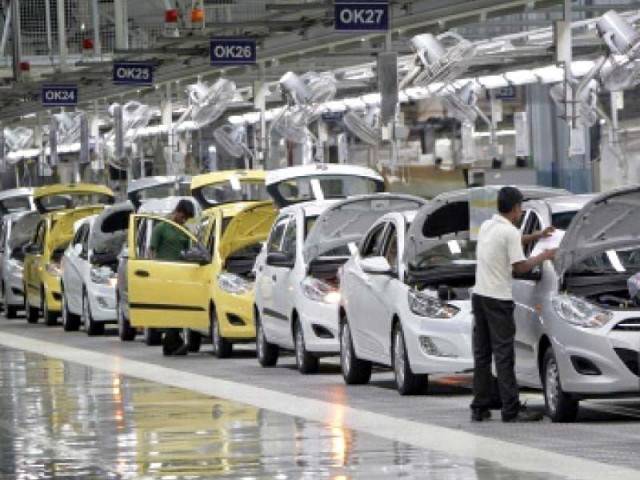Auto industry calls for easing import curbs
OEMs restricted to import auto parts as per quota allocated by SBP

In the backdrop of low foreign exchange reserves, automotive manufacturers have called upon the government to come up with a solution to import restrictions.
The Pakistan Automotive Manufacturer Association (PAMA) has written a letter to the Ministry of Industries and Production to discuss options in order to ease the import restrictions faced by the automobile industry.
“The State Bank’s circular number 9 of 2022 imposes the import restrictions,” noted Abdul Waheed Khan, Director General of PAMA in the letter. “Since May 19, 2022, Original Equipment Manufacturers (OEMs) were restricted to import auto parts as per the quota allocated by the State Bank of Pakistan (SBP). In addition, from August 2022 onwards, automotive vendors were also restricted from importing auto parts under Chapter 84 and 85,” Khan added.
Speaking to the Express Tribune, Abdul Rehman Aizaz, Senior Vice Chairman of the Pakistan Association of Automotive Parts and Accessories Manufacturers (PAAPAM) lamented, “It is very unfortunate that one arm of the government is charging penalties in the form of demurrage and Kibor, plus 3% for late delivery, while the other has disallowed the import of sub-components, CKDs, spare parts and machinery.”
“This shows how wide the existing disconnect is within the government,” he added.
Noting that auto sector is one of the biggest tax contributors, Khan said, “Initially, due to the dire economic situation of the country, the auto industry had fully supported the measures taken by the government to curtail the import bill,” noted Khan. “However now, the above measures have started taking a toll on the auto industry as production of auto manufacturers has come down to almost 30-35% of installed capacity,” he said.
“OEMs are observing no production days for 21-25 days in a month, as the forex quota allowed by SBP is only enough to run plants for five to nine days in a month. Industry wide detention and demurrage charges have peaked to over 2.5 billion rupees for the entire auto industry,” Khan explained.
“It is time to increase the quota by 10% for each month from the current 50% allocated to the passenger cars segment for the import of Completely Knocked Down (CKD) and parts imported by vendors under Chapter 84 and 85. For other segments like tractors and motorcycles, there should be no quota on the import of CKD and parts in Chapter 84 and 85, as these codes are for luxury items,” explained Aizaz.
He further requested the government “suspend demurrage and penalty for late deliveries, as this is takes place due to SBP restrictions and not at the fault of the assemblers or OEMs.” “The way out of the current restrictions on imports could be the inflow of dollars from friendly countries,” stated Muqeet Naeem, Auto Analyst at Ismail Iqbal Securities.
“All of this is happening due to the restrictions imposed by the government and without any fault on part of the auto industry,” said Khan.
Asad Ali, Auto Sector Analyst at Al Habib Capital Markets, told the Express Tribune that the “Auto companies continue to suffer from import restrictions despite the IMF deal, since the rupee is under immense pressure against the dollar. “We do not foresee a breakthrough in the situation until the value of the rupee rises in comparison to the dollar,” he added.
“Now, as the economic situation of the country is improving and the first tranche of the IMF loan has already been received, it is the right time to sit with the auto industry and explore the easing of import restrictions,” Khan proposed.
Published in The Express Tribune, September 22nd, 2022.
Like Business on Facebook, follow @TribuneBiz on Twitter to stay informed and join in the conversation.


















COMMENTS
Comments are moderated and generally will be posted if they are on-topic and not abusive.
For more information, please see our Comments FAQ